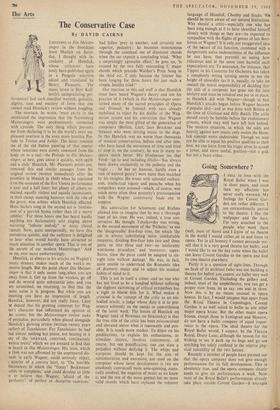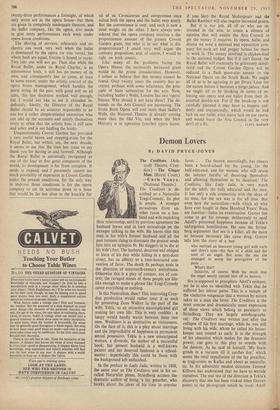Going Somewhere ?
Partly it is a question of sight-lines. Through no fault of its architect (who was not building a theatre for ballet) you cannot see ballet very well at Covent Garden. Excluding the gallery and, indeed, most of the amphitheatre, you can get a proper view from, let us say, one seat in three. Now this is by no means unusual in opera houses. In fact, I would imagine that apart from the Royal Theatre in Copenhagen, Covent Garden is as well suited to ballet as any other major opera house. But the -other major opera houses, except those in Leningrad and Moscow, do not have a ballet company of equal impor- tance to the opera. The ideal theatre for the Royal Ballet would, I suspect, be the Theatre Royal, Drury Lane, although the reason for my Wishing to see it pack up its bags and go are anything but solely confined to the relative phy- sical suitability of the two houses.
Recently a number of people have pointed out that the opera company does not give enough performances for its full development. This is absolutely true, and the opera company clearly needs to give six performances a week. Now most of the Royal Ballet's performances already take place outside Covent Garden—it averages twenty-three performances a fortnight, of which only seven are in the opera house—but these are given in completely inadequate theatres, and the ballet company, like the opera, also needs to give more performances each week under opera house conditions.
The sharing of services, rehearsals and or- chestra can work very well when the ballet is dominated by the opera (or vice versa), but where both are equal, friction is bound to occur. Two into one will not go. Then also while the Royal Ballet, under its Royal Charter, is an autonomous body, it still has no money of its own, and consequently has to come, at least to some extent, under the artistic control of the opera house management, which handles the purse string. In the past, with good will on all sides, this has doubtless worked well enough, but I would not like to see it extended in- definitely. Ideally, the Director of the Royal Ballet should be an autocrat responsible to no one but a rather simple-minded committee who can add up the accounts and satisfy themselves every so often that the artistic boss is still sane and sober and is not fiddling the books.
Unquestionably Covent Garden has provided a very useful haven and stepping-stone for the Royal Ballet, but withhi, say, the next decade, it seems to me that the time has come to say thank you for having us and farewell. Although the Royal Ballet is universally recognised as one of the four or five great companies of the world, its development is far from complete. It needs to expand, and I personally cannot see much possibility of expansion at Covent Garden under the present conditions, for the only way to improve those conditions is for the opera company to cut its activities down to a bone that would be far too close to the knuckle for
all of us. Co-existence and compromise once suited both the opera and the ballet very nicely. But the convenience is over, and each is now a dead weight on the other. I have always con- sidered that the opera company receives a dis- proportionate amount of the present Covent Garden grant, but who is to say what is dis- proportionate? 1 could very well argue the contrary proposition, and, of course, I. would be right on both counts.
Like many of the problems facing the Opera House, the necessarily increased grant would be the, prime consideration. However, I refuse to believe that this money cannot be found. Over twenty years the country has ac- cepted, perhaps with some reluctance, the prin- ciple of State subvention for the arts. Now, including Sadler's Wells, London has two 'opera' houses. Why should it not have three? The de- mands on the Arts Council are increasing. The South Bank Opera will cost more than Sadler's Wells, the National Theatre is already costing More than the Old Vic, and when the New Mercury is in operation (another opera house, if you like) the Royal Shakespeare and the Ballet Rambert will also require increased grants.
But it is our job, all of us who are in- terested in the arts, to create a climate of opinion that will enable the Arts Council to get the money it requires. In opera, ballet and drama we need a national and opposition com- pany for each art and proper homes for them to work in. The money involved is chicken-feed in the national budget. But if it isn't found, the Royal Ballet will eventually be grievously debili- tated and the Covent Garden Opera will be reduced to a flash guest-star annexe to the National Opera on the South Bank. We ought all of us to be agitating to get Drury Lane for the nation before it becomes a bingo palace. And we ought all to be thinking in terms of re- leasing our opera and our ballet from their ill- assorted double-act. For if the break-up is not carefully planned it may have to happen sud- denly and unexpectedly, which would be bad luck on our ballet, even worse luck on our opera, and would leave the Arts Council in the very devil of a fix. . CLIVE BARNES































































 Previous page
Previous page